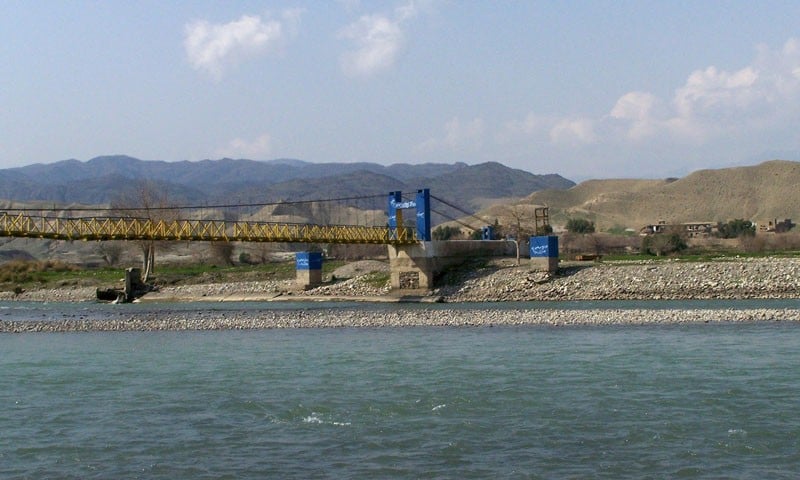
The history of strained relations between Pakistan and Afghanistan emphasises the need to timely address the issue of water before it transforms into a conflict

Relations between Pakistan and Afghanistan have never been great. They have been subjected to various complexities over the past few decades -- the issues in question being related to border disputes especially the recent skirmishes at Torkham border crossing, the 1978-to date war, the refugee crisis, Taliban insurgency and the increasingly friendly relations between India and Afghanistan.
Among all these issues, the issue of water security has been greatly ignored.
Pakistan and Afghanistan share nine small and large rivers. Among these, the Kabul River, which flows into the Indus River in Pakistan, is the most important. This river is impounded by several dams. The Kabul River Basin which constitutes almost 12 per cent of Afghanistan’s territory and supports more than seven million people, accounts for about 26 per cent of Afghanistan’s total annual river flow.
Afghanistan is currently utilising 1.8 Million Acre Feet (MAF) of water and its future water use is estimated to be 3.6MAF. The projected increased water use by Afghanistan can affect Pakistan’s dependence on these waters, and force both countries to negotiate mutually acceptable sharing of water resources.
At the moment, there’s no water sharing agreement between Afghanistan and Pakistan over the Kabul River, its flow control infrastructure, efficient water management or finance.
In the past few decades, both Pakistan and Afghanistan have gradually increased their extraction of water from the Kabul River. Unfortunately, changing monsoon patterns are projected to decrease precipitation over the region of the Kabul River Basin by up to 20 per cent. The history of strained relations between Pakistan and Afghanistan further emphasises the need to timely address the issue before it transforms into a conflict.
In a latest policy brief by Leadership for Environment and Development (LEAD) Pakistan, titled Hydro diplomacy between Pakistan and Afghanistan, which highlights how various factors such as increase in population and rural to urban migration from other parts of Afghanistan to Kabul in search of security and improved livelihoods are expected to increase the water demand in Kabul. Furthermore, as the agriculture sector becomes intensive and hydro-power projects increase, water flow into Pakistan will be affected, which will badly impact the economy and livelihoods. This will be further exacerbated by climate change, the most dangerous phenomenon which threatens the very existence of this planet.
The policy brief says: "Planned water projects on Kabul River, by upper riparian Afghanistan, will adversely affect lower riparian Pakistan. It is critically important to arrive at a consensus by understanding issues, maintaining historical rights and arriving at benefit-sharing options for both countries, through the use of Kabul River water."
The 2003 initiative by Pakistan’s Federal Flood Commissioner to reach a water treaty with Afghanistan could not materialise, which can be attributed to the history of conflict and absence of cooperation on water between the two countries. However, there is a dire need to have consensus over mutual sharing of water, especially when Afghanistan is unilaterally planning to construct dams along the Kabul River which can affect Pakistan’s lifeline, the agriculture sector.
The policy brief reveals that while Pakistan’s policymakers feel that there is scope to forge an agreement over Kabul River with Afghanistan, most senior Afghan decision-makers are sceptical about legal arrangements over the Kabul River with Pakistan. However, trust building and mutual cooperation can help break the ice.
In order to address the issue, the policy brief suggests some confidence building measures, such as establishing favourable conditions for dialogue and continuous interaction; sharing of human and institutional capacities; encouraging joint ventures; and establishment of a joint commission for water cooperation.
A three-phased approach for Pakistan is proposed that can be strategically rolled out with the proposed confidence building measures. In phase I, the establishment of a dedicated cell by Pakistan is proposed to coordinate on existing literature on hydro-diplomacy developed by various stakeholders. The cell should take responsibility of initiating diplomatic dialogue with Afghanistan based on evidence and well-thought out research. In phase II, building upon the success of diplomatic efforts in phase I, the two countries should establish dedicated institutions responsible for taking institutional ownership of Pak-Afghan hydro-diplomacy to ensure sustainability. The last phase proposes the establishment of a joint commission for management of shared waters.
Even acute water differences can be addressed by applying a mix of international water negotiation frameworks and principles of hydro-diplomacy.
The Israel-Jordan Treaty of Peace 1994 is a classic example of how applying principles of hydro-diplomacy can create value and facilitate problem solving.
Through trust-building, effective use of scientific and technical knowledge, socio-economic and legal factors and benefit sharing approach, hydro-diplomacy between Pakistan and Afghanistan can be made a successful case. Political hostility, though a hurdle, can be overcome through the principles of water diplomacy.